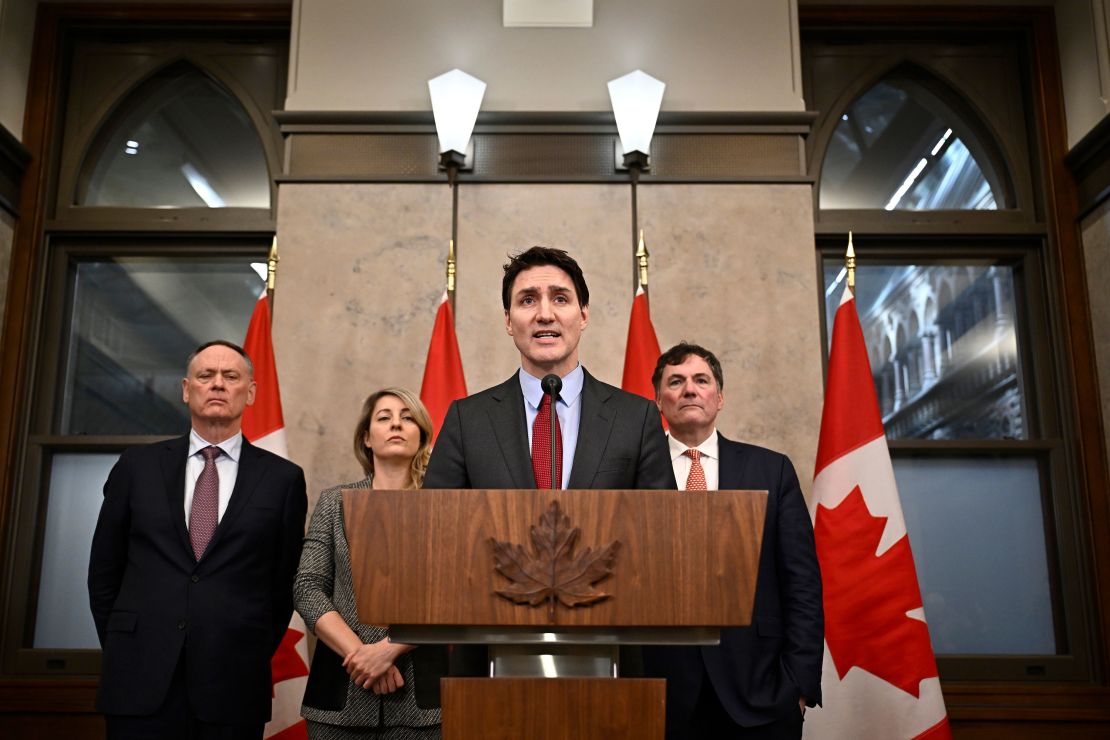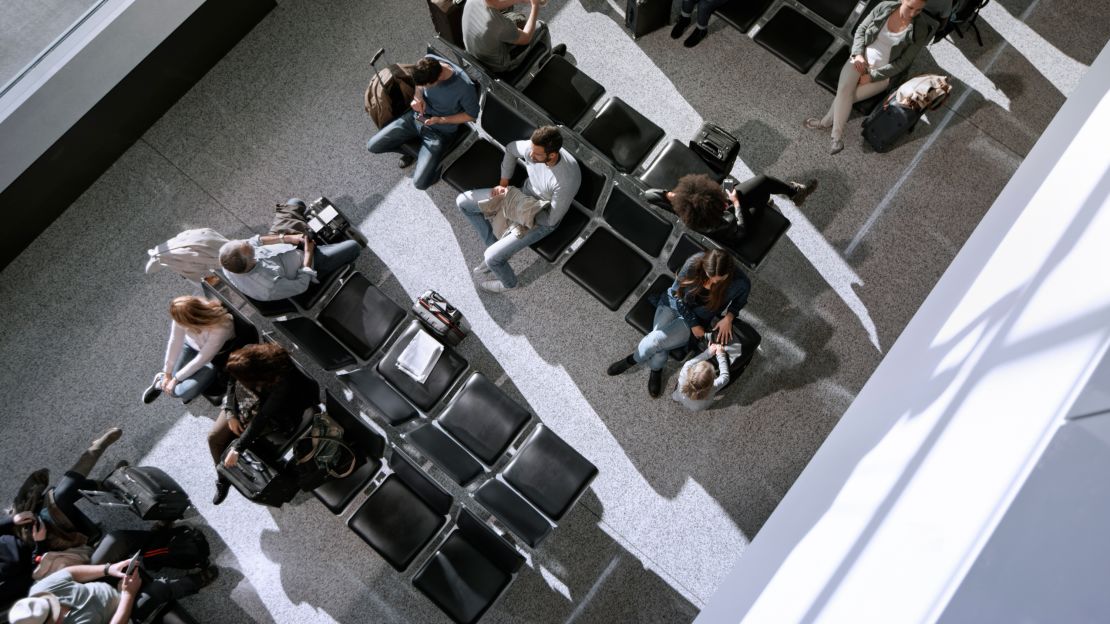CNN
—
Jason Dale had started planning his family’s summer vacation to Tennessee a year ago.
It was to be the Canadian family’s final hurrah, a send-off vacation before his oldest son, who is 18, leaves the family nest.
Together with two other families, Dale, his husband and three sons were going to set off from their Port Dover home in southwestern Ontario for a 10-day road trip that would take them to Dollywood, the Titanic Museum Attraction and into the Great Smoky Mountains.
They had mapped out the route, their rest stops, and booked their resort. It was a trip that Dale had done before when his kids were little, and everyone was looking forward to reliving fond family memories.
They’ve now scrapped all those travel plans.
After Donald Trump was elected president, the group of 11 decided to take a “wait and see” approach. But the US president’s threat to impose punishing tariffs and to annex Canada, along with his trolling of Prime Minister Justin Trudeau, who Trump called “Governor Justin Trudeau of the Great State of Canada,” were the last straw.
“The rhetoric about tariffs, the mockery of our prime minister and the musing about us becoming the 51st state, that did it for all of us,” Dale told CNN Travel. “Everyone was in agreement that we’re not going. We’re going to keep our money in our own country.”
Dale is part of a growing chorus of angry Canadians who have become vocal about boycotting travel to the US over the next four years. People on both sides of the border are already reporting travel-related fallout, with anxiety running both ways.
On social media, the discourse among many Canadians is a mix of worry, fear, outrage and disappointment. While some vow not to step foot in the US while Trump is in office, others say they are torn, as they have upcoming family or professional commitments.
Posts on social media suggest some Canadian snowbirds who usually escape Canadian winters in states like Florida or Arizona now say they are choosing to winter at home or are selling up altogether.
Some pledge to only visit Democrat-leaning states like California and New York. Others say they will continue to visit but spend at Black, Latino, POC and LGBTQ+-owned businesses and support marginalized groups perceived to have a target on their back under the Trump administration.

On Saturday, Trump announced significant new tariffs on Canada that were due to go into effect on February 4 but were paused for one month after last-minute talks between the US president and Trudeau. Mexico and China were also targeted with new tariffs.
In a solemn 13-minute speech Saturday, Trudeau appealed to Canadians to do their part and to “choose Canada.”
“There are many ways for you to do your part,” he said. “It might mean checking the labels at the supermarket and picking Canadian-made products. It might mean opting for Canadian rye over Kentucky bourbon or forgoing Florida orange juice altogether. It might mean changing your summer vacation plans to stay here in Canada and explore the many national and provincial parks, historical sites and tourist destinations our great country has to offer.”
Dale, a 52-year-old high school teacher, had budgeted spending around $5,000 CAD (about $3,430 USD) on his family’s Tennessee vacation. The other two families included a family of four and a single mother and her child.
Canada is the largest source of international visitors to the US. According to the US Travel Association, 20.4 million Canadians visited the country last year, generating $20.5 billion USD in spending. Just a 10% reduction in Canadian travel would result in $2.1 billion USD in lost spending and 14,000 job losses, the group warned in a press release.
The top most visited states among Canadian visitors are Florida, California, Nevada, New York and Texas.
Canadians also pumped $6.5 billion CAD (about $4.5 billion USD) into the US economy during that quarter, spending an average of $1,001 CAD per trip (about $685 USD), with the bulk of their spending going towards accommodations, restaurants and bars. They stayed for an average of four nights.
Kristine Geary, founder of the motor coach tour company Maple Leaf Tours in Kingston, Ontario, said her business has already taken a 30% hit in cancellations for her US packages this year, which include destinations like Nashville, Washington and Myrtle Beach, South Carolina. The morning Geary spoke to CNN, a couple had canceled their booking for Washington, DC.
“Many of our clients are reluctantly canceling their tours to the US with disappointment because they’re putting their long-anticipated plans on hold,” Geary said. “The hesitation and unpredictability surrounding what’s happening and travel to the US have created challenges, and it’s difficult for me to maintain stability and growth.”
Across the border, New Jersey resident Monica Church is also starting to feel the effects of the trade war. Soon after Trudeau announced retaliatory tariffs, Church received a contrite message from a Canadian couple who canceled their month-long stay at her vacation rental in North Myrtle Beach over the weekend. In their message, they cited the trade war as the reason for their cancellation.
Far from being upset at the $2,000 USD loss, Church said she understood and was impressed by the couple’s commitment to cancel their holiday in the name of Canadian solidarity.
“I’m a little jealous of that feeling, where you feel for your country so much that you band together,” Church told CNN Travel. “Kind of like how everyone felt after 9/11, you felt proud to be American. I haven’t felt proud to be an American lately.”

While gun violence has always been a concern for Canadian travelers, Trump’s crackdown on the trans and immigrant communities has also raised more alarm bells around safety for some would-be visitors. When his middle son expressed anxiety about traveling to the US with his two gay dads, Dale said he knew they couldn’t go through with the trip.
“That just did it for me,” he said.
Colleen Whale, 41, from Barrie, Ontario, also mused aloud that in a climate of political upheaval, nothing is certain.
“I have a rainbow on my fanny pack, so am I now a walking target? I’m not part of the LGBTQ+ community but I’m an ally.”
After retaliatory tariffs from Canada, it could be gloves off for some Americans, she added.
“If I show my Canadianism just by the way I speak, is that going to put a target on my back?”
But the fear and anxiety run both ways. Church, who had been discussing a road trip to Montreal and Quebec with her husband this year, also wonders if their American license plate could make them targets in Canada.
“We’re kind of nervous if Canadians are going to be upset with Americans.”
Whale had not entertained these questions when she traveled to Nashville in 2023 with her mom for CMA Fest, a country music festival. They had enjoyed themselves so much that she promised to take her mother again in 2026 to celebrate her 75th birthday.
But the more she watched the news, Whale said she realized she couldn’t go through with it.
With a heavy heart, she went to her mother’s house to announce her decision, breaking down in tears. Her mother, too, broke down, agreeing it was for the best.
“I just didn’t want to disappoint her,” Whale said. “And all of the feelings of the heaviness of the world, it just got to me. It got to both of us.”
Wedding photographer Tamara Boden, 41, pointed out that while it’s “not Trump’s first rodeo,” his second presidency is markedly different for Canadians.
“For me, as a Canadian, these threatening talks of making Canada the 51st state are alarming and enraging,” Boden said from her home in Trail, British Columbia. “That’s different this time around. There’s very real talk about a war on women and a war on minorities. It feels scary as someone with a uterus to go into the States.”
Boden lives 10 miles from the US border. Like many of her neighbors, a typical weekend might involve piling the kids in the car, driving across the border to grab lunch at a good Mexican restaurant, and shopping at stores like Trader Joe’s and Target that aren’t available in Canada.
That won’t be happening again soon, she said.
“That’s not going to be how I spend my Saturday for sure. Not for the next four years at least.”

In a recent survey published by travel management company Corporate Traveller Canada, 85% of the 1,000 small and medium-sized enterprises polled said they anticipate reducing their cross-border travel if tariffs are imposed.
Chris Lynes, managing director for Flight Centre Travel Group Canada, which includes Corporate Traveller, said though the company hadn’t seen mass cancellations for travel to the US so far, the new tariffs and the plummeting value of the Canadian dollar are expected to have significant repercussions for travel across the border.
“If we are hit with broad tariffs, we will see quite the slowdown in travel, especially to the US,” Lynes said, adding that affordability is the main driver of travel behavior.
The Canadian dollar tumbled to a 22-year-low amid tariff uncertainty but rebounded Monday amid speculation about the reprieve.
But Canadians like Boden say the decision to boycott travel to the US is driven first by a moral imperative, and less a financial one.
For their upcoming family trip to Mexico, Boden said they will forgo their usual strategy of crossing the border and flying out of a US airport, which is much cheaper, and pony up the extra $200 CAD to fly out of Vancouver. Because money talks, she said, and the turn of events in the US made her realize she’d rather support the local Canadian economy over the US.
“It’s not just a matter of sticking it to the Americans, because I do believe that the average American is good-hearted. But unfortunately, the person running their country is unhinged at the moment.”










